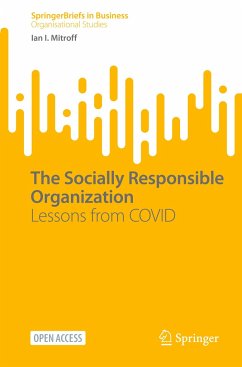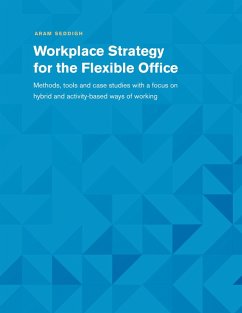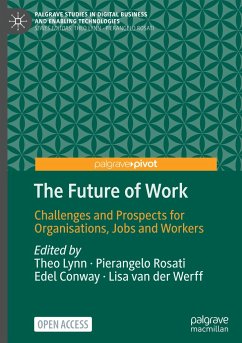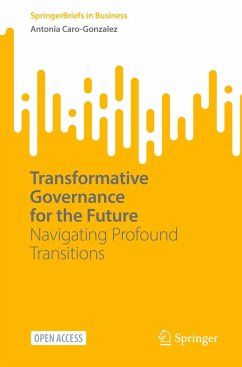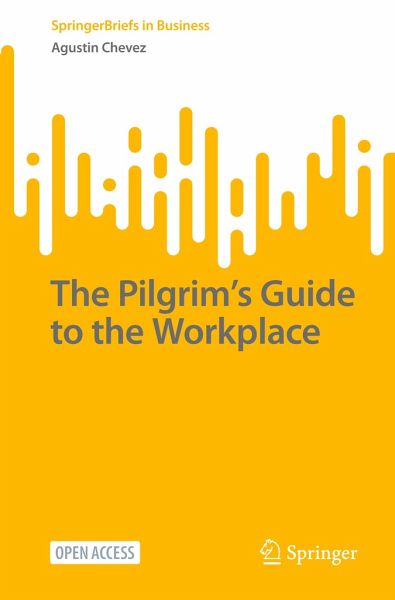
The Pilgrim's Guide to the Workplace
Versandkostenfrei!
Versandfertig in 6-10 Tagen
23,99 €
inkl. MwSt.

PAYBACK Punkte
12 °P sammeln!
This is an Open Access book.Hoping to incubate a unique idea about workplace design, Dr. Agustin Chevez walked in isolation for 42 days from Melbourne to Sydney. His pilgrimage delivered 34 Signposts, a collection of insights which hold the promise to guide us to a better place to work.While firmly positioned within the shifting context of work, the Signposts point away from reactive solutions with a short shelf life. Instead, these markers are infused with a diversity of thought instilled by Agustin's pilgrimage and reclaim the forgotten qualities of solitude, boredom, adversity, and absurdit...
This is an Open Access book.
Hoping to incubate a unique idea about workplace design, Dr. Agustin Chevez walked in isolation for 42 days from Melbourne to Sydney. His pilgrimage delivered 34 Signposts, a collection of insights which hold the promise to guide us to a better place to work.
While firmly positioned within the shifting context of work, the Signposts point away from reactive solutions with a short shelf life. Instead, these markers are infused with a diversity of thought instilled by Agustin's pilgrimage and reclaim the forgotten qualities of solitude, boredom, adversity, and absurdity as mechanisms to deliver innovation and create improved working environments.
On his way to Sydney Agustin relied on maps and people with local knowledge of the lands he traversed. Similarly, in this book, he consults people with local knowledge in various design disciplines, management, and technology as he navigates the many regions of the workplace and work practices covered by the Signposts. When he reaches the end of the known trails, he starts laying paths that take us closer to where the Signposts converge.
Agustin writes from the perspective of a pilgrim, architect, workplace consultant, and researcher and invites you to join him as a fellow pilgrim. You will be rewarded with a journey that revisits our assumptions about the way we use space to host the ever-evolving notion of work - an expedition leading not only to better versions of the workplace, but a better version of ourselves.
"This book takes about three hours to read, and it could take a lifetime to fully extract all the benefits that it contains. This does not suggest that there are not immediate benefits available from reflecting on and applying the Signposts that are core to the book's intellectual contribution."
- Peer Review extract
Hoping to incubate a unique idea about workplace design, Dr. Agustin Chevez walked in isolation for 42 days from Melbourne to Sydney. His pilgrimage delivered 34 Signposts, a collection of insights which hold the promise to guide us to a better place to work.
While firmly positioned within the shifting context of work, the Signposts point away from reactive solutions with a short shelf life. Instead, these markers are infused with a diversity of thought instilled by Agustin's pilgrimage and reclaim the forgotten qualities of solitude, boredom, adversity, and absurdity as mechanisms to deliver innovation and create improved working environments.
On his way to Sydney Agustin relied on maps and people with local knowledge of the lands he traversed. Similarly, in this book, he consults people with local knowledge in various design disciplines, management, and technology as he navigates the many regions of the workplace and work practices covered by the Signposts. When he reaches the end of the known trails, he starts laying paths that take us closer to where the Signposts converge.
Agustin writes from the perspective of a pilgrim, architect, workplace consultant, and researcher and invites you to join him as a fellow pilgrim. You will be rewarded with a journey that revisits our assumptions about the way we use space to host the ever-evolving notion of work - an expedition leading not only to better versions of the workplace, but a better version of ourselves.
"This book takes about three hours to read, and it could take a lifetime to fully extract all the benefits that it contains. This does not suggest that there are not immediate benefits available from reflecting on and applying the Signposts that are core to the book's intellectual contribution."
- Peer Review extract





